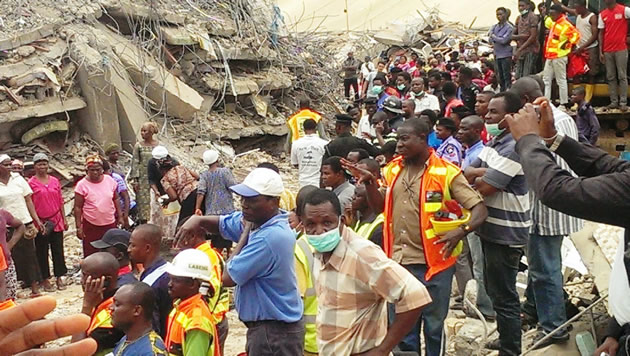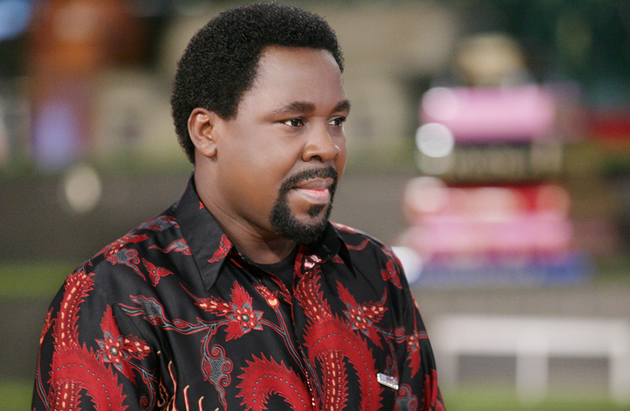Scoan tragedy: So many questions, so few answers

 Hildegarde The Arena
Hildegarde The Arena
SOUTH AFRICAN correspondent for eNCA television Robyn Kriel, writing in IOL recently, said a member of the international media, who had been based in Lagos for some years made this shocking remark: “You don’t want to die in Nigeria . . . You are just another number. You will be told ‘people die all the time in Nigeria, what makes you so special?’” And, Dr
Peregrino Brinah sort of affirmed this when he wrote in the Osundefender: “TB Joshua only killed 100+ people who volunteered of their own volition and not under compulsion to visit him for miracles. They got miracles. We cannot say they were forced . . .”
Kriel was among many people adding their voices to the September 12 tragedy when a guest house at the Synagogue, Church of All Nations collapsed in Lagos, killing at least 115 people, 84 of them South African pilgrims and injuring many more. To date, at least two Zimbabweans are known to have perished in the tragedy.
 It’s almost three weeks since that September 12 tragedy and the above remarks constitute a fraction of the controversy on an incident that Africa and the international community is conveniently allowing to die a natural death. A conspiracy of silence, almost!
It’s almost three weeks since that September 12 tragedy and the above remarks constitute a fraction of the controversy on an incident that Africa and the international community is conveniently allowing to die a natural death. A conspiracy of silence, almost!
We stood in awe when it happened for no one ever imagined that something like this would take place at the famed Scoan where people from various nationalities – rich and poor alike, heads of state and government – come and go as they seek divine intervention from its founder and overseer Prophet Temitope Balogun Joshua on life’s mundane issues.
We also never thought that something so calamitous could happen in the backyard of a personality famed for performing countless miracles and giving profound prophetic messages.
Notwithstanding, this has been a unique tragedy for the writer when focus (sympathy and support alike) is more on Prophet TB Joshua than on the victims and their families. Surf the Internet, and you will see that from day one, the victims were not the story.
This is probably why it never became a breaking news story for major international news networks. Even as a day two or three journalistic story, it never rose to that magnanimity. That’s how cheap life is.
When the guesthouse at SCOAN collapsed at midday on September 12 instead of looking at the accident as a public and international tragedy, it was saddening to note that the discussion on mainstream and social media was reduced to commonplace issues that follow TB Joshua: true and false prophets and that if indeed he is a true prophet, why was it that he did not see this accident coming?
His legion of followers came to his defence arguing that critics should be mindful of what the Lord says in the Bible: “Do not touch my anointed ones, and do my prophets no harm” (1 Chronicles 16:22).
Brickbats are still being thrown as each side sets out to prove whether TB Joshua is a true man of God or not and what constitutes a true “man of God”.
These will remain contentious issues as long as people throw away common sense and argue emotively, misinterpreting the word of God in the process.
But, to do so with complete disregard of a yet to be solved tragedy is not only myopic but it exposes everyone at the centre of this tragedy. Would the narrative be different if an American, British or French citizen had been a victim even if he/she had gone to Scoan of their own volition?
Should these be the central issues of this tragedy? Why are the victims and their families being left out in the cold as the court of public opinion races to see who can say the best or worst things about TB Joshua?
Why did Africa sink so low: a guesthouse collapses in the capital of the continent’s most populous nation, which is also the new economic powerhouse, and the majority of the victims (both the dead and injured) are from South Africa, and the best that people can do is point fingers, in most cases doing so without any shred of evidence?
It was not until September 16 that President Jacob Zuma announced that 67 of the deceased were South African nationals.
He did so when different figures were being floated around on various websites, blogs and social media, the majority of them publishing without official verification.
This laxity was also displayed on the guesthouse’s number of floors: how many floors did it originally have, and how many were being added on? Did people have to travel to Scoan to find out this basic information?
Where were the responsible authorities and the media in particular? Even the South African media did not have to roar into life after the presidency had announced the casualty figures, considering that many of their nationals frequent Scoan, and also considering that South Africa is the major transit point for nationals from the Sadc region?
When so many people were reported dead, the reportage did not have to focus on the Zimbabwe Government and/or Zanu-PF officials’ views about the Nigerian pastor.
The figure of the dead that finally rose to 115 should have jolted people’s conscience. So too the video clip of the crumbling guesthouse, which should have generated insightful debate and educate the continent about how to expeditiously respond to tragedies, humanitarian assistance; setting up a multi-national commission of inquiry comprising people with various expertise; repatriation of the deceased’s remains to their countries and the counselling of the affected relatives.
But as it were, it became very easy for critics to question the SA authorities about why it took them four days to announce that figure. These were questions for the host nation, not even Scoan. Where were the Nigerian authorities and the media, who should have given leadership in this tragedy?
Whose responsibility was it to inform the world – Scoan or the relevant Nigerian authorities? We ask this simple question because we thought that by the end of the day on September 12, the relevant Nigerian security organs would have secured the crime scene to allow the rescue operation to be carried out uninterrupted and to also ensure that the crime scene is not contaminated.
Arguments on the prophetic were important, but this is an abstract concept considering that there were immediate issues to deal with like the alleged behaviour of some church members obstructing rescue operations. When a building so big goes down, it is also natural to know how many people were inside and/or around the vicinity, and also the number of rooms it had.
Social media should have been seized by these issues and interrogated them and also forced the relevant authorities to act with speed by the nationalities involved and other demographic information. So too the claims about the “strange aircraft” hovering around the synagogue before it collapsed!
Instead, the silence about the plane is giving the impression that the Nigerian airspace is not secure and that Boko Haram is now so well equipped that they are in possession of aircraft.
If it is also an act of terror, who was the target, TB Joshua or the South African pilgrims since there were almost 350 of them? Terrorists can easily make political capital out of such a huge figure.
If this was sabotage, why did Nigerian President Goodluck Jonathan say that he would engage construction companies so that they don’t see a repeat of collapsing buildings? He made these remarks a week after the incident. As someone who gets regular security briefings, it is difficult to connect why a head of state would link a building that might have collapsed due to a terror attack to the numerous building collapses in his country. It just does not add up.
While all options are on the table, we also ask why crucial evidence on the alleged plane that circled the building four times was made public to the media and global audience before it was authenticated by experts. How admissible is that footage now as part of the evidence?
Was the church supposed to be an arbiter in a case where they could also be the accused? Why was the church also in a hurry to point fingers while the rescue operation was underway, and even before they had confirmed the number of casualties?
If this was terrorism, what does it mean for South Africa and the region since TB Joshua is going to visit South Africa every month? Will distance be a barrier for the alleged terror attackers?
Do accidents make public figures impervious to criticism or should they be above public scrutiny? If so, who then should be made liable?
One cannot also speak about this incident without mentioning the Ebola virus disease. How serious are the continent’s citizens in ensuring that EVD does not continue to spread? People should continue to travel, but at what cost in the face of Ebola?
Finally, Africa should be a major player in global events, but how will it convince the international community about safety and security? How can we plead our case when the truth about a tragedy that killed more than 100 lives seems so difficult to piece together?







Comments